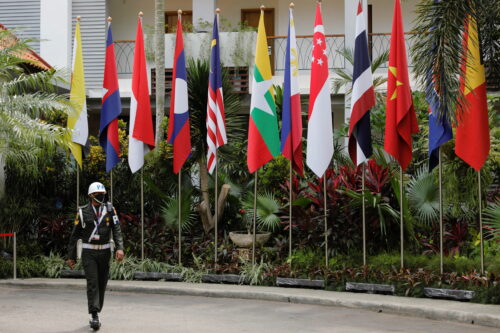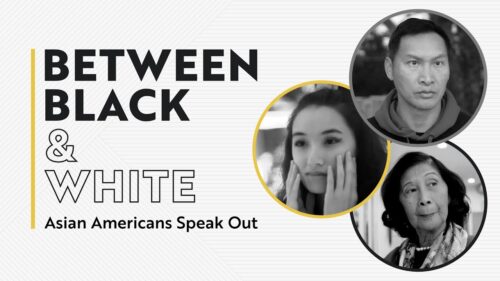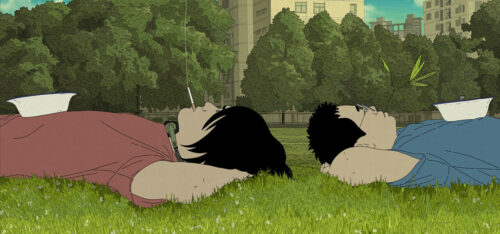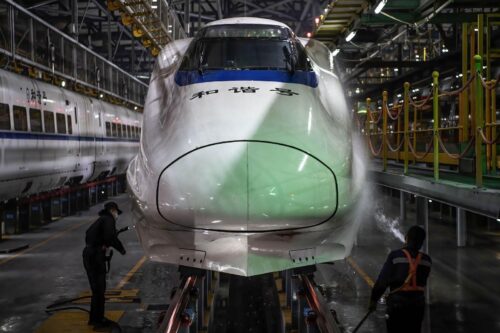Watching ‘Hamilton’ at the end of the world
What is it like to watch "Hamilton" in 2020, when the romanticized version of an optimistic, inclusive America feels detached from reality? Yangyang Cheng explores what Lin-Manuel Miranda's hit musical has meant to her over the years, how the election of 2016 compelled her to repurpose her life, and the enduring power of the written word.

The evenings follow a ritual. At 11 p.m., I dash downstairs and across campus to the student-run cafe, order a tall drip before the place closes, and hurry back to my desk. When the caffeine wears off two, three hours later, I turn to YouTube and click play on that video. Four and a half minutes is all I need to stay awake for another hour. I catch the last shuttle home at 4 a.m. if I’m lucky. Otherwise I sleep on my office futon, its dark green mattress permanently indented in the shape of my body.
It is 2015. I am finishing my Ph.D. in physics at the University of Chicago. The recording I watch every day in the wee hours is from six years before, when Lin-Manuel Miranda closed the White House Poetry Jam with a song about Alexander Hamilton, the country’s first treasury secretary.
Born and raised in China, I am only vaguely aware of the name. The Hamilton I’m more familiar with is the 19th century Irish mathematician William Rowan Hamilton, who devised the functional form of classical mechanics. But as Miranda belts on stage about the orphan immigrant who worked his way out of death and destitution, who came to the continent for an education and helped start a new nation, I can hear in Hamilton’s early life a version of mine. The misfortunes he endured are a reminder of my privileges. The soaring heights he reached complete the motivational tale.
The camera cuts to the first couple. Michelle is snapping along, her eyes bright with amazement. The president does not snap. He lifts his head slightly, his right hand over his chin. He smiles, like a proud professor observing his star pupil deliver an answer he already knows.
In the fall of 2008, as a college senior in China, I watched Obama’s first debate with John McCain. For his closing remarks, the junior senator from Illinois spoke of his late father. A student from Kenya in the 1960s, Obama Sr. “wrote letter after letter” to study in the U.S., because “there was no other country on earth where you could make it if you tried.”
That obscure moment, which would have been a cliche for anyone knowledgeable about American politics, became etched into my mind. I too was applying for doctoral programs in the U.S. I too grew up with modest means, the father absent, the family fractured. I felt Obama was speaking directly to me, that across 8,000 miles, two borders, and a computer screen, he saw me and understood me.
Half a year later, I accepted an offer from the university the new president had worked at. The connection added a magical allure to a city with no shortage of legends. At age 19, I was ready to be enchanted, to embrace a new beginning in the land of opportunities. I watched every episode of The West Wing, my heart racing each time the star-spangled banner appeared in the opening credits. I binged the HBO series John Adams, developing a little crush on the actor who portrayed Thomas Jefferson. I ordered a copy of The Declaration of Independence and the Constitution of the United States, and carried the booklet with me as I flew across the Pacific.
The day Obama won re-election, I cheered among thousands of Chicagoans at McCormick Place, having earned a ticket to his victory speech by volunteering at a phone bank. Standing behind me in the crowd were an Australian diplomat and his sister. We struck up a conversation, and I commented that the consular officer resembled “a famous actor,” whose name I had unfortunately forgotten. His sister was amused and offered to take a photo of me with her camera. When she sent me the pictures the next morning, I was able to tell her that the actor was Rufus Sewell, who played Alexander Hamilton in HBO’s John Adams.
Now, as I watch Obama smile approvingly at Miranda rapping about “the ten-dollar Founding Father without a father,” I am reminded of that episode from 2012. It is one of those random facts in life that, when carefully selected and arranged, forms a narrative for someone trying to tell a story.
One evening in the closing days of 2015, I find myself alone at work. It’s the holiday season, the campus empty. I have passed my defense, submitted my dissertation, worn a cap and gown and received my diploma. But I still come to the office every day. The routine is comforting as I wait for the U.S. immigration service to issue my work authorization so I may start a job in upstate New York. My life has been stripped so bare over the past year, my schedule wound so tight, I do not know where else to go or how to relax.
That night, staring at the piles of books and papers that have accumulated on my desk, I realize there is no putting off the task. Soon, my name will come off the door, and someone younger will be using this space. Before I start going through the dusty folders, I put Hamilton on the stereo.
Six years after Miranda’s first performance at the White House in 2009, the biography of Alexander Hamilton, animated through the language of hip-hop, has developed into a critically acclaimed Broadway musical. The cast album is available online, but I have refrained from listening — until now.
The rapped sections propel me to move fast, while the long, somber notes allow me to linger over old pages. When the last song starts two and a half hours later, I have sorted through every stack of files. I pause and pay attention to every word, sung by Hamilton’s colleagues and his family, mourning his death, recalling his legacy:
And when you’re gone, who remembers your name?
Who keeps your flame?
Who tells your story?
I think of the years I spent at this institution, the people who came and went. I think of my family in China, not knowing when I might see them again. I think of my father, who, like Hamilton, never got to grow old. I crouch down on the floor and bawl like a child. With a perfectly-timed conclusion, the soundtrack has turned a chore into a ceremony.
I play the album again when packing up my apartment and again on the flight to Ithaca. As the plane lifts off, I sense a part of me tearing away. The pain of severance is physical. I close my eyes and sink into the beats. The songs become therapeutic.
I try to explain to my new colleagues in Ithaca that the move from Chicago was a lot more traumatic than coming to the U.S. from another country, but no one believes me. I even question myself, as if I’m being overly dramatic. But I also know how I felt on both occasions. My feelings cannot be dissociated from my experiences in these places, or from the years the moves occurred and the events they coincided with.
During the darkest moments of my life in China, the idea of America kept me alive. My time in Chicago proved to be everything I had hoped for, and more. The pursuit of physics offered me a path out of my birth country and became a refuge in trying times, but science alone has never been enough. I aspire to more without knowing what it is or can be. I believed Chicago had the answer, with its history, its diversity, its vibrancy, a city always on the move. But I have left it before finding out, relocating to a town that is so small, tranquil, and content with itself that I feel like an outsized, restless, ungrateful misfit.
I carry on with insane hours at work; staying busy helps me forget where I am, at least temporarily. The closest bus route stops at 9 p.m., and sleeping in the office is a habit I do not wish to keep. I walk home every day at 3 a.m. and listen to Hamilton on the way.
I let the songs speak for me. The many tragedies in the characters’ lives converge into an ocean where I can drown my grief and still emerge breathing. The epic arch of a revolution allows me to stretch my wildest ambitions. In Hamilton I find the permission to dare. I’m young, scrappy, and hungry. I dream of glory. I’m never satisfied.
It takes me half an hour to get home in good weather. When the first few tracks have become a little overfamiliar, I start with the fourth, “The Story of Tonight,” where Hamilton and his friends “raise a glass to freedom” on the eve of war. My very long day concludes with one of Miranda’s favorites in the album, “Wait for it,” performed by Leslie Odom Jr. as Aaron Burr. It’s about living through loss, the whims of fate, and the redemptive power of time. After indulging myself in the fantasy of personal ascension, this song is an inflection point, a lesson in humility:
We rise and we fall
And we break,
And we make our mistakes.
And if there’s a reason I’m still alive
When ev’ryone who loves me has died
I’m willing to wait for it.
I spend Election Day 2016 in Chicago, my first trip back. There is a watch party at the university, next to the coffee shop that fueled my many nights. My friends and I take pictures with a life-size cardboard cutout of Obama. A student reporter interviews us for the school paper. I admit my concerns over the grave dangers posed by one candidate and the deep divisions present in this country. But, “I believe in the decency and collective wisdom of the American people,” I say.
I have picked an outfit for the occasion: a silver leather jacket, blue sparkly shoes, a silk scarf with the letter H. I’m dressed for a celebration. By the end of the evening, I’m at a funeral. The world as I know it is dead.
I leave the venue with my friends, averting equally teary and despondent eyes in the building. A couple of blocks away, we spot a yard sign for the woman who lost, the wire bent, the sheet torn.
That is not right, I think to myself. I walk over, trying to fix it, but the damage cannot be undone. I pick up the broken sign and cradle it in my arms. I bring it back to where I’m staying. When I wake up the next morning, the sight of the blue letter with the right arrow is unbearable. I toss the mangled piece in the trash.
I return to Ithaca a few days later. There is a package in the mail. Hamilton: The Revolution, co-authored by Miranda and the journalist Jeremy McCarter, documents the creation of the musical, a theatrical revolution in itself. The gorgeously-produced tome includes images on and off stage, as well as the libretto annotated by Miranda. I had ordered it as a gift for myself, to make up for not being able to watch the play in person.
The epilogue to the book features a photo of Obama on set, addressing the audience after watching the performance himself. The authors note many similarities between the first Black president and Hamilton; the show will go on after Obama leaves office, as will the spirit of America they both represent. I wonder if the book would reach a different conclusion had it been written now. Maybe it was released just in time, when the promise still felt true.
Hamilton is a product of the Obama era, an embodiment of its triumph and aspiration, as well as its limits and deception. Casting Black actors as slave-owning Founding Fathers is a bold artistic choice, but it’s never as subversive as it claims. “This is a story about America then, told by America now,” says the director Thomas Kail. The mythology of racial progress is seductive. The narrative is nothing new. The form’s greatest appeal is also its fundamental flaw, that the original sins of this country can be redeemed by token individuals.
Cheering the success of an extraordinary few, be it Alexander Hamilton or Barack Obama, is a convenient way to feel good and be hopeful; it also diverts attention from the bigger and messier picture, from historical injustices and structural inequalities. The system excuses itself by focusing on the singular striver. For the countless others whose names wash away with time, whose lives do not translate into literature, their stories complicate the plot, revealing a more beautiful and more terrible truth that we ignore at our own peril.
I visit D.C. in the spring of 2017. A dear friend is driving. She suggests some music for the ride.
“I know you like this album,” she says, turning up the volume. It’s Hamilton.
“I have not listened to this for a while,” I say. Hearing the rhythmic tracks again, I am, for a brief second, taken back to a time not so long ago, when I clung to those words like gospel, when I thought life’s great challenge was to figure out the world as is and find my place in it.
We pass a cloud of cherry blossoms by the river. I see the Jefferson Memorial in the distance. I remember how the name used to make my heart flutter. I was so young and naive. Having grown up in a racially homogeneous society, it did not cross my mind then that the republic Jefferson envisioned was never meant for someone like me.
For months, politicians and pundits, dismayed by the results of the election, have nevertheless touted the unique strength of “our institutions,” all the checks and balances the Founders put in place to prevent tyranny. I would like to believe them but I cannot afford to. As a Chinese woman, my humanity has never been self-evident to the powers that be.
The sky is getting heavy. The air smells like rain. Christopher Jackson’s voice radiates from the car stereo, singing as George Washington:
Let me tell you what I wish I’d known
When I was young and dreamed of glory,
You have no control.
Who lives, who dies, who tells your story
I start writing for the public in 2017. If the election had turned out differently, if I were not living in a place as isolated as Ithaca, I would not have felt compelled to do so. My mother might point to all the stories and poems I doodled when I was little as proof of my literary potential; she is also the one who tore up my diaries in middle school and banned extracurricular reading at home, because the pursuit of letters was deemed a frivolous and harmful endeavor. In retrospect I see the contradiction, that a vocation cannot be simultaneously useless and dangerous.
What has changed after 2016 is my purpose. I want to make sense of the world, so I read, but I’m not seeing what I want to say. I recognize the significance of the time I live in. Being a passive observer feels like a dereliction of duty. I do not know what else to do from a secluded location. Writing, it seems, presents the least barrier of entry. I sit down at my desk. I open a blank document. I type.
I’ll write my way out…
Write ev’rything
Down, far as
I can see…
I’ll write my way out…
Hamilton has faded from my daily life, but I still hear echoes of this chorus in my head. Miranda says Hamilton “embodies the word’s ability to make a difference.” At 17, the young Alexander witnessed the destruction of his hometown in St. Croix by a hurricane. He described the devastation in a heart-wrenching letter, which, after its publication in the Royal Danish American Gazette in 1772, earned the penniless orphan a ticket to the mainland, where he wrote his way into the American revolution.
“I’ll write my way out.” When I was listening to the album every night in 2016, the sentence was a proclamation of ambition, the determination to break away and rise above the limited circumstances of one’s upbringing. “Write” could be a metaphor for any kind of work. Now the verb has become literal. The rest of this verse also changes its meaning. Writing, solitary by construct, is also a cure for loneliness. The hand holding a pen is always reaching in as well as extending out. A line of words can bridge the farthest distance, through space as well as across time. Attention is the purest form of generosity. To speak in anticipation of being heard is an incomparable act of faith. I write for clarity and companionship. I write to assert my existence at a time when too many forces are conspiring to deny and diminish it.
I move back to Chicago in the summer of 2018 through a laboratory fellowship. After putting down my bags in the new apartment, I go outside to watch cars and people go by. The sight of traffic has never brought me more joy. Sunlight bounces off nearby buildings. I feel chilly for an instant as something frigid inside me thaws. Then I’m warm and whole again.
“It’s like you’ve never left!” a friend exclaims before realizing his mistake. The city may look the same, but so much has changed over the two and a half years I was away, its steely exterior is almost deceiving.
We are getting markers and poster paper at the store. There is a protest the next day against the Trump administration’s border policy. Migrant families are forcibly separated. Children are put in cages in the name of national security. The magnitude of the cruelty is unprecedented, but the legal machinery was invented under Clinton and Bush and expanded by Obama, who oversaw the deportation of millions.
I never participated in a demonstration when Obama was in office. I thought I would wait until my career was more established, my status more secure. It took the raw awakening of 2016 to realize that security is not guaranteed with time, that any rights I enjoy are the fruits of past rebellions, that any chance at a future must be fought for today.
The building where I spent six years of graduate school is slated for demolition. I come back for a last farewell. Yellowed copies of doctoral theses pile in the hallway; some were written before I was born. The futon sits in my old office, its dark green mattress rearranged. I grab a Sharpie and write on its frame: “Y^2 slept here and had many dreams.”
It is 3:30 a.m. on July 3, 2020. I sit in front of my computer in eager anticipation. I would have gone to bed, but Hamilton is trending on social media. In half an hour, a recording of the musical, featuring the original Broadway cast, will be available to stream online.
When I moved back to the Windy City two years ago, I thought I’d watch the show in person but never did. Occasionally, a line from the album comes to mind unprompted, and I will listen to that track once, as a reminder of a kinder, simpler time. My recollections of that pivotal period in my life will always have Hamilton in the background. I thought things were hard then, and in a way, they were. If only I could have known how much harder it would get.
Miranda is live-tweeting the countdown. Fans are swarming his comments. After months of quarantine in a global pandemic, the camaraderie makes me ecstatic. I turn off the lights and imagine myself in a crowded theater, waiting for the curtain to drop.
Leslie Odom Jr. steps on stage. I let out a little gasp.
Knowing the show so well short of seeing it live, I’m not surprised by the aesthetics of the set, the grandeur and the meticulous attention to detail. I have anticipated every move in the performance. What I did not expect is my own reaction at the end. The romanticized version of a young America, brimming with optimism, feels so dissonant at the present, when the empire has outlived its myth. I’m viewing Hamilton with different eyes, but, like the opening of a time capsule, the final track conjures up a familiar ache. However many times I’ve heard it, the voice of Eliza still makes me cry:
I stop wasting time on tears.
I live another fifty years.
It’s not enough.
…You could have done so much more if you only had —
Time.
…And when my time is up?
Have I done enough?
Will they tell my story?
Elizabeth “Eliza” Schuyler Hamilton, masterfully portrayed by Phillipa Soo, gets the last word. In history, she was the keeper of her husband’s legacy, organizing his papers and pushing for the publication of his biography. Dying young is tragic. The blessing of longevity also carries the burden of unending grief. Eliza’s remarkable long life brings the musical to its poignant conclusion, transcending political drama to probe the eternal lesson of living with death.
“I imagine death so much it feels more like a memory,” a young Hamilton says upon arriving on the continent. He will repeat the verse toward the end, right before being fatally shot by Burr at their duel. In his footnotes, Miranda refers to this sentence as “the most autobiographical thing I’ve ever written.” I would like to think that I get what he means.
Contemplating death is not the same as wanting to die; it is about figuring out how to live. The awful glow of death illuminates everything within its reach. The inevitable boundary gives life its meaning. At various points in my 30 years, I thought I might not be able to survive. When those moments have come to pass, I feel like living on stolen time.
Death is feared until it is confronted. Accepting mortality is self-emancipation, perhaps the most liberating act of all. “Write as if you are dying,” the author Annie Dillard teaches in The Writing Life. “What would you begin writing if you knew you would die soon? What could you say to a dying person that would not enrage by its triviality?”
I am writing this column as more than 1,000 people die every day in the U.S. due to COVID-19, a disease that could have been contained through effective governance. Federal agents in military gear are kidnapping protesters and transporting them in unmarked vehicles. The dehumanizing tactics developed for the border are terrorizing American cities. The president refuses to state whether or not he will accept the outcome of the November election. The relationship between my birth country and my adopted home is at its lowest point in four decades and continues to deteriorate. Every night I’m afraid of going to sleep, as if staying awake can delay the arrival of more bad news.
What is the point of writing when the world is running out of time? I do not pretend to have the answer. What I do know is that dictators burn books and jail writers, that revolution happens on the page before it reaches the streets. Language is our inheritance. Stories form our genealogy. Words protect what missiles cannot. If we keep using the words we have and create new ones, a tomorrow will emerge from our unencumbered imagination — and I believe there will be a tomorrow — that holds what guns cannot kill and prison walls cannot stop.
Writers have always worked in uncertain times. This is our time. Putting away the book of Hamilton, its music still ringing in my ears, I return to the words of Polish poet Zbigniew Herbert, written in the past century at another time when the world appeared to be ending:
you were saved not in order to live
you have little time you must give testimony
be courageous when the mind deceives you be courageous
in the final account only this is important
Yangyang Cheng and the Science and China Column will return on the final Wednesday of every month.






